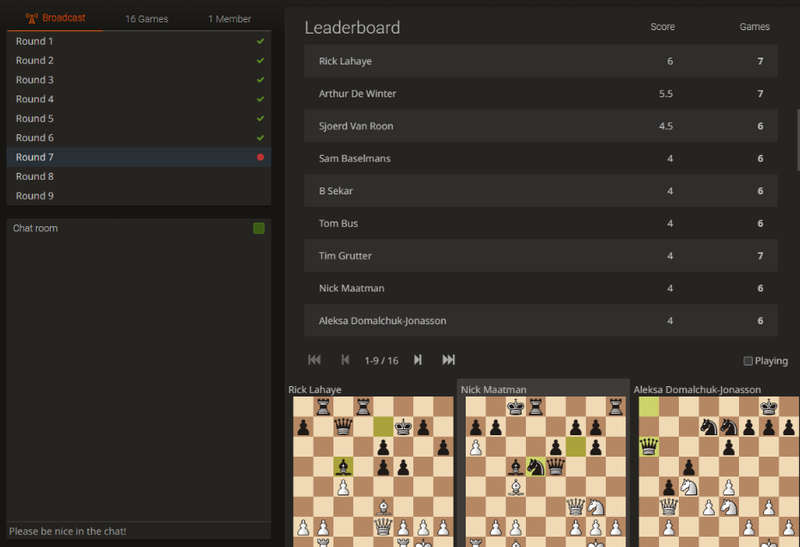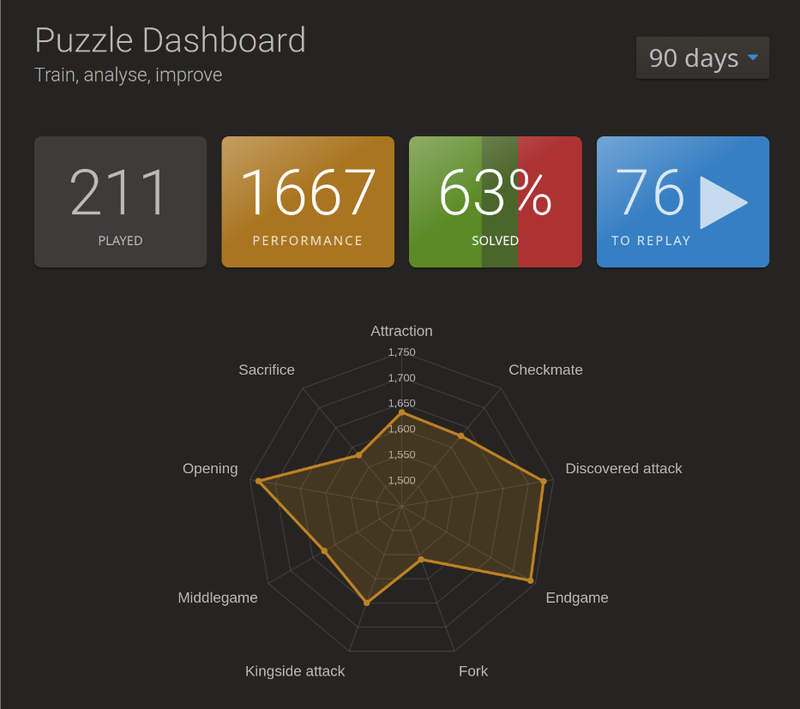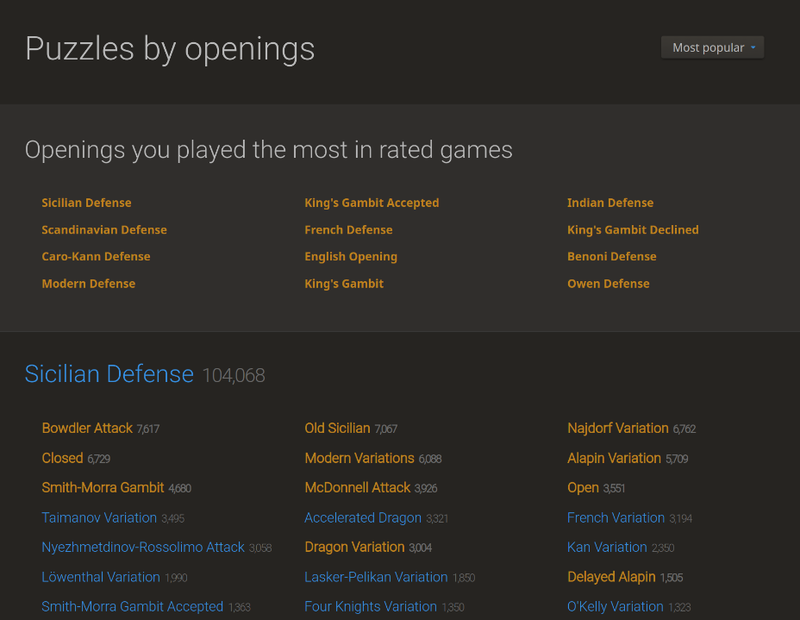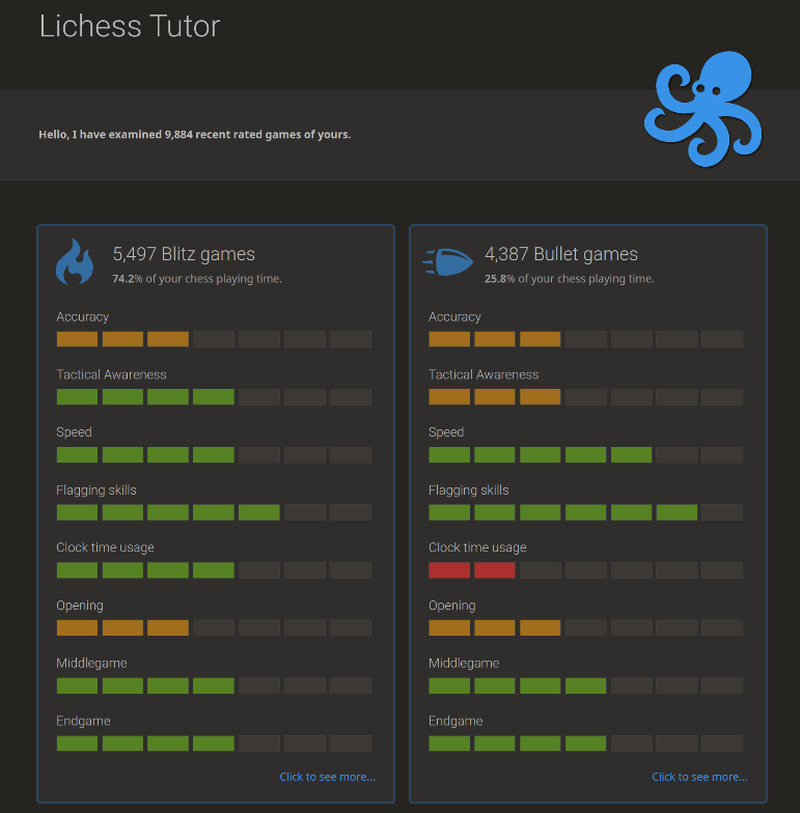
Lichess Half-Year Update & New Feature Sneak Preview
August is the perfect time for a June update :)As we move into August the Lichess team started to curate the improvements, new features, and work your donations and support has allowed us to do. In only the six months from January to June, we have already accomplished so much this year! Read on to see some of the work we're most excited about, plus an early look into an exciting new feature.
If you want to find out more about what we've done in the last six months, you can find our (rather lengthy!) changelog, here.
8. Email Notifications for Correspondence Games
Correspondence games give the players anywhere from 24 hours to 14 days to make a move before ending on time. Naturally, this can result in some people forgetting to make their move and losing on time.
To improve that experience, players can now opt-in to email notifications listing their correspondence games, to help them keep track of the games they're playing.

If you're interested in applying this setting, you can find it in your preferences here.
7. New Machine Learning, Neural Network, Anti-Cheat Assistant
We've historically been quiet about what we do from an anti-cheat perspective (security via obfuscation!), so we can't share a huge amount about our new ML assistant, Kaladin, as proud as we are of it.
Kaladin supports the work that our existing AI, Irwin, does to protect Lichess. Kaladin is a neural network that considers different information than Irwin does to detect suspicious patterns in online play, and crucially doesn't need to do an engine analysis on a sample of games to spot those patterns.

This helps save a lot of time, and allows more games (and players) to be quickly reviewed by Kaladin. As with Irwin, games which appear suspicious are sent to further review by human moderators, except for very obvious cases which Irwin or Kaladin can handle themselves (although appeals are always reviewed by humans).
Kaladin is a great example of what can be achieved with community will, and a motivation to improve online chess for everyone. Kaladin was developed primarily by moderator volunteers with professional careers or backgrounds in programming, computer science, and data science. Their work now also directly helps to support the team of around 100 industrious and dedicated Lichess moderators who maintain the chess-side of Lichess and keep it a fun place to play.
6. Improvements for Visually Impaired Users
As far as we know, Lichess was the first major chess playing server to enable screen-reader support and allow blind and visually impaired users to play online chess. As far as we know, we're still the only major chess playing server to allow accessibility for blind and visually impaired users to play online chess. Chess is a fulfilling and cognitive sport and we strongly believe that no one, regardless of disability or any other reason, should struggle to access chess.
Driven by that philosophy, Lichess has improved the user experience for visually impaired users. Recently, we've ensured that premoves can be completed for those using the screen reader support function. Additionally, smaller tweaks like how PGN is copied in blind-mode, and bigger tweaks like optimising screen-reader support on post-game analysis and Lichess studies, are now supported.
Users who read on will see some cross-over in accessibility here and in our updates to puzzles, too - with keyboard support (including braille keyboards) also now offered to puzzles.
5. Changes to Broadcasts
Giving visibility and supporting the over-the-board chess world (aka "IRLichess") where Lichess can is important to growing the ecosystem of chess as a whole. The eagle-eyed will have undoubtedly noted we have made some small, but significant changes to our PGN broadcasts.
Critically, many of our PGN broadcasts from major tournaments will now also show the tournament standings, making it easier to keep track of which player is leading, and what results mean for the field as a whole.

Broadcasts can also now be set up 12 months before the date of the event is due. This has allowed Lichess to be able to create a tournament calendar with linked broadcasts for all major chess events. In no small part, this is due to another small army of fantastic volunteers and the community as a whole who help us source PGN broadcasts, set them up on Lichess, and ensure any bugs or glitches from the PGN source is swiftly corrected - also guaranteeing we can post more events up than before, too.
4. Official Teams for Variants
Did you know that Lichess' official charitable objective is translated into English as "to promote and encourage the teaching and practice of chess and its variants"?
The variant community has always been a vibrant and passionate part of Lichess as a whole, with many in our team having been active in informally organising for the variant community in the past -- such as non-FIDE recognised variant Lichess World Championships, and Lichess World Cups.
Now, Lichess has official teams with the aim of supporting each variant community more closely. Additional resources and learning materials can also be found within each of the official teams -- so now there's no excuse for not trying a new variant.
The official teams:
Antichess
Atomic
Chess960
Crazyhouse
Horde
King of the Hill
Racing Kings
Three Check
3. Additional Translations and more Language Support
In addition to our amazing moderators, Lichess also has literally thousands of passionate volunteers who help to translate the site into other languages via CrowdIn.
With many core aspects of Lichess having been 100% translated into dozens of languages, additional parts of the site are now ready for translation -- including /class and /practice (which has improved translations) -- helping to make chess more accessible to all.
In addition, support has now been added for right-to-left written languages (like Arabic).
2. Supporting External Chess Engines for Analysis
With this update, users can analyse games with any engine that they have access to, likely faster than the Lichess analysis would be able to analyse it. Different engines have different programming (well, potentially except for Fat Fritz 2 and Houdini 6...) which means they will often make different suggestions and give humans different ideas to explore.
This new feature is technically still in alpha, meaning changes are still possible to happen. But, the intrepid are fully welcome to test it out as long as they have some technical proficiency. When polished, it should be relatively easy to set up and require no special knowledge.
1. Updates to Puzzles
In early 2021, we produced a large update to puzzles, such as the puzzle dashboard which at a glance suggests your tactical weaknesses and strengths.

Additionally, puzzles were sorted into themes and motifs -- allowing you to practice a particular type of puzzle.
Over the course of 2021 and this year, work on puzzles has been one of our forefronts. Smaller quality of life changes like allowing keyboard input of solutions, or navigating puzzles by keyboard, allows puzzles to now be more accessible than before. New assessments of your strengths and improvement areas are now suggested to you.
Critically, a major update recently in 2022 is that puzzles have now also been sorted by opening -- meaning that you can now practice against specific structures and opening positions you're likely to encounter in your pet lines.

And combined with a new feature we're currently working on, it has potential to really help you find weaknesses in your game and become a more well-rounded player overall, entirely for free.
Bonus -- New Feature Preview: Lichess Tutor
Thibault and the team have been working on a new feature: Lichess Tutor. It's still in very early stages of development -- meaning we can't be clear when it will be publicly released, and that the UI and concept may undergo several revisions.

At its core, Lichess Tutor has sliced users ratings into small segments, roughly 30 rating points per slice. You're then compared to your rating peers within your particular slice. For example, if you had a 1515 rating, you would be compared just against other players in the 1500 - 1530 category, to help you determine where you're better than average against your competition, and where you need to put in some more work.
Lichess Tutor will then aim to help you improve if you wish, by guiding you to free (always free!) resources to help you improve. For example, if the user from the screenshot looked deeper into their openings category, Lichess Tutor currently shows how the player performs against their peers in the specific openings they play as white and black. Drilling down into that, Lichess Tutor currently recommends puzzles from those frequently played opening structures, at the player's opening level, to practice.
Lichess Tutor is a big project, with a lot of new moving parts to develop. For example, to help make the most of Lichess Tutor, players need access to good quality educational resources. This takes time to develop. Something many would consider simple -- opening pages -- first of all required creation of a new lightweight PGN viewer, developed to be used on any other website. In addition, with around 3,000 openings, that's a lot of new content for the community and team to source and create (and eventually translate). Combine this with other areas Lichess Tutor could be linked to, such as Lichess Studies, Lichess Videos, and the scale of the project quickly becomes apparent -- and why we can't share a public release date!
The ambition is also to go beyond openings, of course. Consistently missed middlegame motifs and themes could be highlighted to the player. Likewise, recurring mistakes in common endgame patterns could also be spotted by Lichess Tutor. And just like with openings, specific educational resources, puzzles, and trainers could then be recommended to the player.
Where would you like to see Tutor go next? Let us know in the comments!
More blog posts by Lichess

Candidates Round 12: Three-ways Tie in Open, Tan Maintains her Lead
Nakamura and Gukesh catch up with Nepomniachtchi in Open, while Tan maintains a safe distance from e…
Candidates Round 11: Nepomniachtchi, Tan Back in Sole Lead
Nepomniachtchi and Tan lead alone once again, while Nakamura's win puts him in shared 2nd with Gukesh
Candidates Round 10: Nakamura and Caruana Bounce Back, Lei in Shared Lead
Nakamura and Caruana bounced back with wins against Abasov and Firouzja, respectively, while Lei bea…
